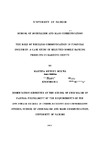| dc.description.abstract | The poor and marginalized have been excluded from formal banking services for a long time. This exclusion has been occasioned by various factors key among them logistics and economic viability. Mobile banking, a wireless communication innovation promises to break these two barriers by providing access and also aggregating financial transactions by individuals to constitute viability. While this exclusion persisted, the use of the mobile phones to perform monetary transactions did not occur. So what has happened all of a sudden? Consequently, despite this breakthrough, products utilizing this mobile phone technology have not experienced success in uptake and use. So, what ails these relationships and what needs to be done to stabilize these networks for financial inclusion?
The specific objectives of the research were to Justify mobile banking as a viable model for financial inclusion, determine the context of use of mobile banking and its role in the uptake and use, draw lessons on the usefulness of the Actor Network theory as a framework for studying context of use and finally ascertain the role of actors in the design, roll out and use of mobile banking products for stabilization of the networks. The Multi case study approach was used whereby the ANT intepretivist ontological foundation was used to follow actors while ANT distinct ontology was used to study actors and in the analysis of the study findings. Data sources were purposive dictated by the ontology of following actors. An agents list was obtained from participating banks while users were identified at the outlets. Actual data collection involved qualitative questionnaires, in-depth interviews, FGDs and a triad.
Findings revealed that agency banking was positively received by both users and agents and could be used to extend financial services to marginalized populations. However agency banking had challenges that could hinder its effective implementation and in effect increased uptake and use. Only 17% of the typical rural farmer had taken up the services leading to low commissions which could not support the business, many deserving markets still did not have outlets and people still did not have access. This was attributed to the stringent regulation by the agency banking regulator, customer awareness and education especially to the new segment, and quality of service by the agents.
Conclusions included that translation needed to recognize that products were context specific, the stability of mobile banking products was dependent on the interplay of all the actors (human and non human) and what emerges from this interplay. Successful translations depend on how faithful key actors are towards their alliances. Significantly the study established three key theoretical implications in mobile banking if the implementation process has to result to stabilization:
No single actor has the ability to set the networks course or impose its own culture and personal goals upon the other nodes sharing the network because the logic of the network sets the rules for participation in the network, a certain size of access points and users was necessary if mobile banking w~ to sustain itself and translation required that all means be used to ensure that the most successful model of mobile banking is put in place before roll out.
The recommendations of the study included that regulators needed to revise regulations to promote market development, the focal actors to step up awareness campaigns and literacy seminars for rural populations, support agents financially and also train of assistants. | en_US |

